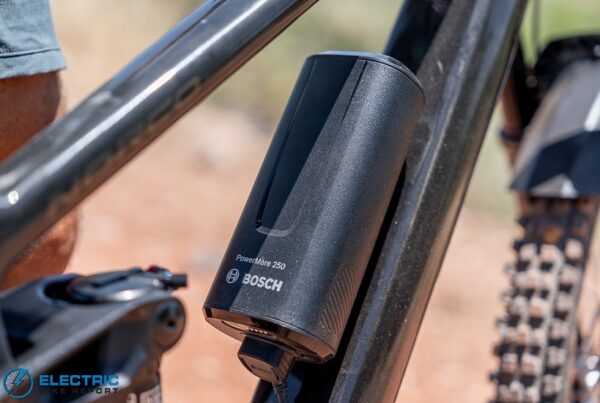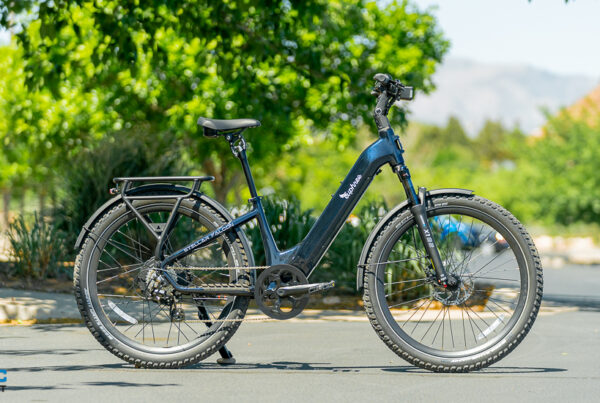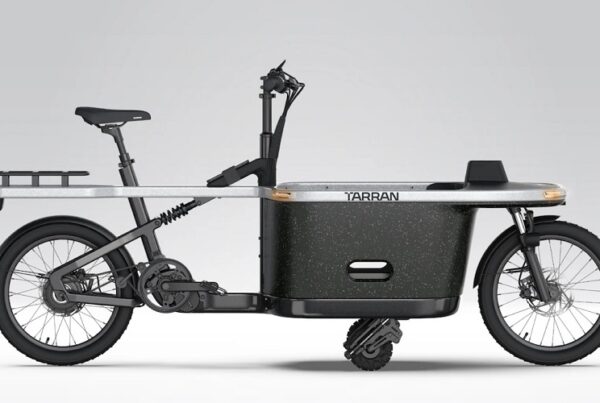Some links may be affiliate links. We may get paid if you buy something or take an action after clicking one of these.

Whilst Shimano have often gone toe to toe with Bosch mid-drives in the city, trekking and e-mtb areas they have not been forthcoming in other areas where they might have wanted to match Bosch’s increasingly extensive offering of mid drives, such as cargo bike specific systems….until now!
There’s also some intriguing new tech this week in the form of carbon composite, injection moulded e-bike frames on the immediate horizon (2022) and further experiments with e-bikes and hydrogen. Which technologies will become mass adopted, which will remain specialist applications and which will disappear is as hard to tell as ever…
In this week’s news:
- New Firmware from Shimano Makes EP8 and E6100 Mid-drives Cargo Compatible
- Ribble Introduce Two New Superlight E-bikes
- Brompton Electric Apple App Now Available
- Carbon Composite Injection-Moulded Frames for 2022
- Olympia’s New 900Wh Model
- Italy’s Military Police E-bike
- E-tech Developments with Hydrogen Hybrid and UK’s New ‘Self Driving’ Laws
- Bike Share Companies Going Public and More E-bike Biz
New eBikes and eBike Systems
SHIMANO INTRODUCE E-CARGO VERSIONS OF THEIR EP8 AND E6100 MID-DRIVES
Shimano recently announced that their EP8 and E6100 cargo-specific drive units will now come with built-in firmware designed for powering heavy loads.

They add that ‘Shimano E-Cargo drive units, gearing and brake systems now meet the technical standard (DIN 79010) for usage on transportation bikes and cargo bikes. The motors themselves are apparently rated to carry up to 250kg gross weight.
RIBBLE ADDS TWO FURTHER LIGHT E-BIKES TO ITS RANGE
Described as Ribble’s ‘flagship electric carbon road bike’, the Endurance SL e, is now available in a new Hero edition – at 10.5kg claimed to be one of the lightest in the world. It features the Mahle X35 rear hub motor system and Shimano’s premium Dura-Ace Di2 electronic shifting.
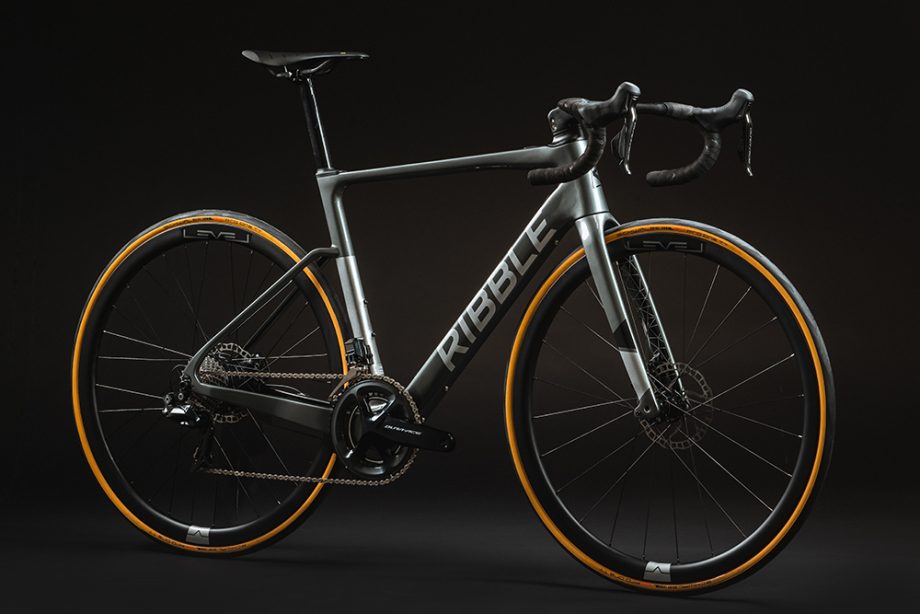
The Level 5 full-carbon integrated handlebar/stem combination is aero optimised and super-stiff and there are Level DB35 Superlight EBM carbon wheels.
The UK-based firm has also launched the Endurance AL e, its first aluminium e-road bike, with a stated weight of 13kg that, like all Ribble e-bikes, also uses the Mahle system.
The bikes are priced at £6999 and £2799 respectively. You can read Electric Bike Reports full story on Ribble’s ultra-lightweight bikes here.
BROMPTON RELEASE APP FOR THEIR ELECTRIC FOLDER
UK folding bike maker Brompton have announced an app for their electric version (which we reviewed back in Jan 2020) though it’s available only for Apple phones at the minute, not Android.

It will allow Bluetooth connection to the bike so you can see speed, trip time, battery charge, current power level and more on their phone display.
Crucially it allows a rider to shift power modes from their phone – before that you needed to lean over the bars to do so to access the buttons on the top of the battery back just above the front wheel.
Other app info available includes service history, total mileage, and being able to locate the nearest Brompton-friendly bike shop for parts and servicing.
NORWAY’S BUDDY ELECTRIC MOVE FROM CARS TO INJECTION-MOULDED E-BIKES
Buddy Electric AS from Norway has more than 20 years of experience with electric vehicles and is best known for the manufacture and sale of the Buddy electric car. In 1993 Buddy Electric developed its first e-bike, but the market was not yet mature, as was the technology, so the project was put on hold, Four years ago, the topic of e-bikes was restarted successfully and today Buddy Bike is one of the largest e-bike manufacturers in Norway.

But with e-bike sales now outstripping sales of electric cars, Buddy Electric has announced it has teamed up with Germany’s V Frames who will offer a carbon-composite injection moulded sX1 frames to be available to e-bike manufacturers from 2022. The frame will apparently be ‘100% recyclable and be more than 50% less CO2 intensive to produce than traditional frame production.’
Buddy Electric’s own take on the sx1 will be equipped with high-end Sachs Motor and Rohloff speedhub, putting this bike at the top of the market and is slated for availability in Q1 2022. The sX1 frames will also be available to bicycle manufacturers in a range of component configurations in an open-mould concept starting Q2 2022. The sX1 frames will also be used for the Isoco Carbon Buddy series.
OLYMPIA INTRODUCE POWER NINE WITH 900Wh BATTERY
Italian firm Olympia has introduced the Speedster sporty trekking style e-bike with a huge 900Wh battery that it calls it’s ‘trump card’.
It also features an 85 Nm OLI Sport mid-drive – it is the same combination Olympia use on some of their e-mtbs, so it is clearly a performance orientated setup.

The Speedster also features a 6061 double butted aluminum alloy frame, 9 derailleur gears, disc brakes, Zoom suspension seatpost, Rst Pulse suspension fork with high damping power.
The Speedster comes in regular and sloping top tube models and retails at 3,280 euros.
ITALWIN REVEAL MILITARY POLICE BIKE
Italian firm FIVE have revealed an e-bike that will be used by Italy’s national military police, the Carabinieri Corps. It features a 630 Wh battery, hydraulic disc brakes, 10-speed gearbox and a second generation FIVE F90 mid-drive.

FIVE say it will be used in the operations of the Carbinieri Command for Forest Protection.
Cycling Accessories
MAKE ANY HELMET A SMART HELMET
Helmet comms specialist Sena recently launched their pi helmet accessory that promises to ‘make any helmet a smart helmet’.

The Pi device simply attaches to your helmet strap (max strap width 18mm) and, with its built in microphone and speaker, lets you communicate with another Pi unit using two-way Bluetooth intercom as well as allowing you to listen to music and to make and receive phone calls. The Bluetooth range is claimed to be around a quarter of a mile. It retails at US$99.
E-tech
SELF-DRIVING CARS POSSIBLY HEADING FOR THE UK’S ROADS….BUT SLOWLY
According to the BBC self-driving vehicles ‘could be allowed on UK roads by the end of this year’ – according to the Department for Transport.
There would be strict limits to what is allowed – automated lane-keeping systems (ALKS) would be the first type of hands-free driving legalised and the car would only be able to travel at 37mph (60km/h) max whilst using this technology.
NtG say the SunRider will carry 1m³ Euro pallets with a max payload of up to 150kg of cargo.
Why is a solar powered vehicle being launched right now? NtG say it’s due to a drop over time in the price of solar tech and an increase in the efficiency of the panels – ie more charging power for your money.
NtG say the panels themselves have a 545 watt-peak generating ability and the trike appears to be a Euro-spec e-bike with a 250W hub motor. Claimed max range is 60 miles but the company doesn’t say under exactly what conditions – but the huge 1600Wh battery certainly makes it sound feasible.
URBAN ARROW EXPERIMENTING WITH LITHIUM BATTERY PLUS HYDROGEN FUEL HYBRID
Several recent reports have detailed how various European bodies are teaming up to run an electric cargo bike trial with a hydrogen range extender to double its range, in addition to the more conventional lithium ion battery it also has on board.

French Pragma Industries pioneered hydrogen e-bike technology and are now cooperating with Dutch e-cargo bike specialists Urban Arrow and the Arnhem-Nijmegen Business school in the ‘Everything about Hydrogen’ Foundation to develop the HydroCargo model.
The trail system features a bottle of compressed hydrogen gas and a fuel cell that converts hydrogen gas and the oxygen in the air into electricity. The electricity generated by the system is used to drive the motor of the cargo bike. It is hoped in future the bikes will be refuelled at the special hydrogen filling stations which will take around 3 minutes. Currently there is one at the business park where the trial is based.
The idea is not only to extend the range of the bikes but to demonstrate that the future of the industry might be less dependent on lithium which is now needed for a huge variety of electrically powered applications.
Hydrogen looks great for the end user in terms of practical and quick refuelling but manufacturing and most critically safely storing compressed nitrogen is the more difficult and costly part and means hydrogen is unlikely to compete commercially with lithium any time soon, though if the these obstacles can be overcome its day might yet come.
eBike Services
KITZUMA NOW OFFERING READY-TO-RIDE E-BIKES TO YOUR DOOR
Bike-shipping service Kitzuma Cycling Logistics that specialises in ready-to-ride bike deliveries is now working with Independent Bike Dealers (IBD) to deliver bikes and e-bikes to their customers as well.
Buy a bike from one of their IBD partners, like Motion Makers and Kitzuma will provide door-to-door delivery of fully built bikes; they’ll even help the customer with basic initial setup like saddle height, basic operation and more.
Any brick-and-mortar IBD anywhere in the US can work with Kitzuma, if they offer online sales: This can help make even a small local shop become a national presence with the highest level of customer service available.
eBike Biz
CHINA’S BIGGEST BIKE SHARE GIANT SET TO GO PUBLIC IN THE US ALONG WITH DENMARK’S DONKEY
Hello is China’s largest bike-share provider recently filed an S-1 (indicating it is likely to make a public offering of stock and be exchange-listed). Apparently Hello plans to raise as much as $1b through its public offering.

Hello’s size is staggering; 10 million bikes across 400 cities with 1 in 5 trips on Hello bikes being on electric versions.
Rather smaller – but still going down the public route – Danish bike-share firm Donkey Republic is preparing for a listing on the Nasdaq First North with an IPO target of $16.25m. The company operates 13,000 bikes and e-bikes in 60 cities across 14 European countries.
WHY DOES THE 5KG BATTERY LIMIT MATTER?
LEVA-EU wants to see a future where light electric vehicles (LEVs) are more common – think of the likes City Q who are members of the European Light Electric Vehicle Association and are preparing to produce their e-bike car (classed as a regular e-bike).
Despite the weatherproofing and comfort advantages of such vehicles, it seems part of the reason these vehicles are not popular is restrictive legislation – according to LEVA-EU at least. EBR has carried stories about how LEVA-EU thinks the speed restrictions and power restrictions are effectively hampering the development of innovative light electric vehicles that could help solve the climate crisis.
The latest obstacle in the way of LEVs, say LEVA-EU, is the European Commission’s proposal for new battery legislation that LEVA-EU say is ‘no less than an existential threat to most companies in the Light Electric Vehicle (LEV)-sector.’
The current proposals would only categorize batteries in certain electric cycles as portable batteries subject to what LEVA-EU say are reasonable requirements. Only sealed batteries up to 5 kg to be used in vehicles with a seat and a motor of no more than 750 watts come under the category of ‘portable batteries’. All other batteries, i.e. in electric scooters, mobility scooters, e-mopeds, e-motorcycles and other electric vehicles in the L-category would be categorized as electric vehicle batteries and would become subject to what LEVA-EU call ‘very extensive and complicated sustainability requirements supplemented with heavy-duty administration. It is simply impossible for LEV-battery producers to comply with electric vehicle battery regulations. It is also very debatable whether these requirements are necessary and adequate for LEV-batteries.’
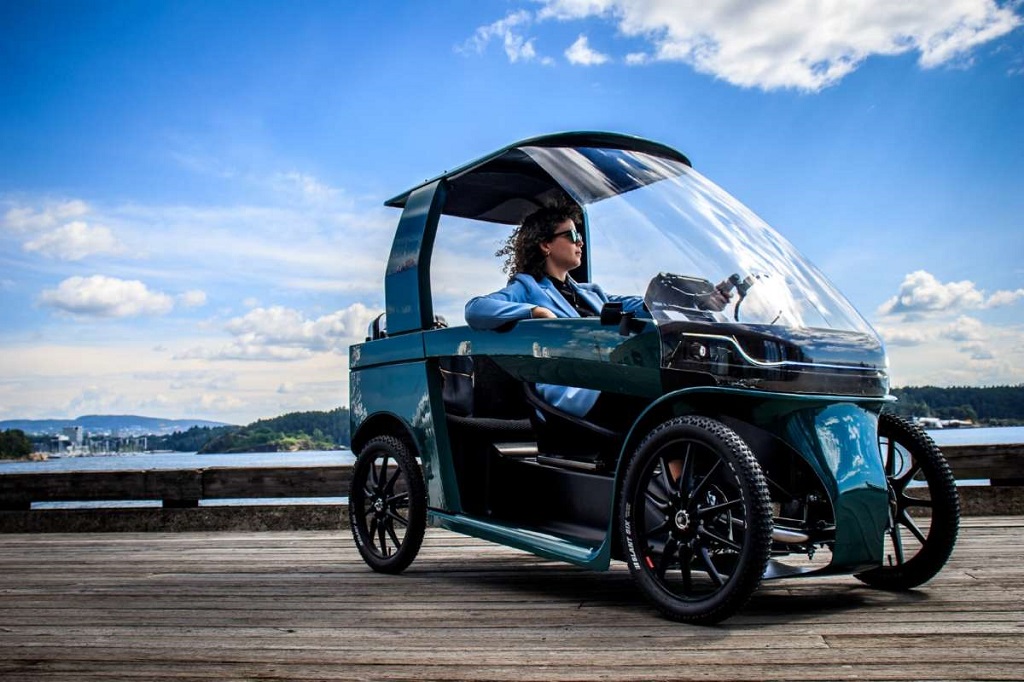
Related
Reader Interactions

Source link






